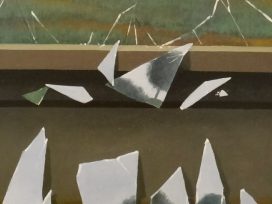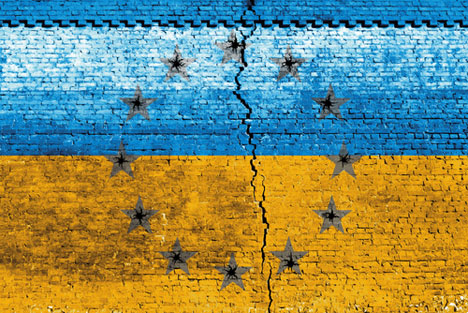Ten years ago, in the wake of the spectacular Orange Revolution, quite a few authors mulled over the possibility of success for Ukrainian reforms and their decisive impact on Russia’s subsequent transformation. The belief was largely based on the fact that many Russians perceived Ukraine as a kindred nation to whom it was much closer, in cultural and civilizational terms, than to any other post-communist neighbour and which, therefore, was far more relevant and acceptable as a role model. Dmitri Trenin, a liberal Russian intellectual and the director of the Carnegie Center in Moscow, succinctly expressed this view when he emphasised the supposed attractiveness of a European Ukraine that is democratic and successfully modernised as a model for his compatriots. Back in 2007 Trenin wrote that: “The process of Ukraine’s European integration (initially and for a long time in the form of ‘more Europe in Ukraine’), and its eventual outcome (‘Ukraine in Europe’) will be good news to Russia. Russian isolationists will have far fewer arguments for a special Russian way […] A Ukraine that is committed to modern European values and speaks Russian with confidence could become a force for good in Eastern Europe, the Caucasus and Central Asia […] Ukraine’s potential strength lies in what Russia has so far been unable to use, i.e. soft power.”
Break free of Putinism
The flip side of the attractiveness that a European Ukraine could have for many Russians was the loathing that Russian authoritarian, ardently anti-western and anti-European rulers felt for it. In the last ten years this hatred has apparently played a role in the subversive activities of various Russian agencies vis-à-vis Ukraine, which culminated in 2014 with the direct military invasion of Crimea and a large-scale hybrid war in Donbas.
The ultimate goal of the entire adventure, as Russian expert Igor Torbakov argues, was the rescue of Putinism – a system in which “power is wielded by a narrow, tight-knit group of people who cannot be easily removed from power, the rule of law does not exist, the legislature is a rubber-stamp in nature and there is no genuine space for political and economic competition. Ukraine’s attempt to break free of the Putinist system and build a more competitive framework in its place poses a mortal challenge to the master of the Kremlin. Keeping this in mind, it is not so surprising that Putin responded to Kyiv’s challenge with reckless brinkmanship.”
The view of a democratic and European Ukraine as a desirable (or highly undesirable) template for Russian development largely explains the attitude that is held in Russia by various actors in regards to Ukraine’s attempts at democratisation and Europeanisation. This, however, does not reveal a much more important and ground-breaking consequence of such a possible change: namely, that a European Ukraine which is fully integrated into Euro-Atlantic structures and institutions would inevitably force Russians to reconsider their archaic and quasi-imperial identity based on a number of outdated myths and “invented traditions.” It would further force them to develop a modern national identity which is much more suitable for today’s world of nation-states and more compatible with modern liberal-democratic and anthropocentric values.
However, the truth is also that, with its legacy of Kyivan Rus’ and some other elements of historical symbolism, Ukraine remains a crucial part of the Russian imperialistic mythology and imagination. Furthermore, it will continue to remain a “sublime object of desire” for too many Russians until it crosses the point of no-return, becoming firmly institutionalised in Euro-Atlantic structures, graphically symbolised by NATO and EU membership.
The ongoing Russian-Ukrainian war, euphemistically defined as a “crisis”, marks the beginning rather than the end of a painful and painstaking process of emancipation of both nations from a pre-modern “imagined community” of Eastern Slavs (the medieval Slavia Orthodoxa), reinvigorated and over-politicised today in a highly ambiguous concept of Russkiy mir. Ukrainians, for a number of reasons, are more advanced in this emancipation process, while many other Slavic nations – like the Russians (or, even more, the Belarusians) – still bear to a certain degree some sort of quasi-religious identity that is highly conductive to holding essentially pre-modern, non-civic values and engaging in patrimonial and clientelistic relations. This type of identity was formed as a result of a specific imperial discourse and emerged from certain practices. It was supported, in modified forms, by the dominant power brokers in all three countries which resisted a radical de-Sovietisation of their fiefdoms, mainly because they felt that the unmaking of Soviets – or imperial, heavily mythologised “Orthodox Slavs” – into Ukrainians, Russians and Belarusians meant, more than anything else, a remaking of the obedient quasi-feudal subjects into free and self-confident citizens.
Thus, the promotion of overarching civic identities in all three countries should be an urgent task for reformers as it is the only way to facilitate much-needed modernisation. This, however, requires a full understanding of how local pre-modern identities – a kind of Orthodox-Slavonic “ummah” – have been historically constructed, and what discourses support them today. The process stems roughly from the turn of the 17th century when the development of a modern Russian (as well as Ukrainian and Belarusian) identity was effectively derailed by some westernised Ukrainian intellectuals, mostly clerics, who were engaged by Peter the Great in his project of empire building. It was they who “rediscovered” an imaginary connection between the Moscow tsardom and Kyivan Rus’. The European idea of translation imperii (in English: transfer of rule – a concept used for describing history as a linear succession of an empire that invests power in a singular ruler – editor’s note) was quite common among the inhabitants of the Polish-Lithuanian Commonwealth. They would invoke it to assert their special role and therefore status within the new political reality that emerged after a part of Ukraine had broken away from Poland and made an alliance with Muscovy. The idea of the Little Rus’ and the Great Rus’ was invented as a clear historical and symbolical analogy of the Little Greece as Greece proper and the Greater Greece as a vast territory of Greek Mediterranean colonisation. This meant granting Ukrainians central status within the newly born empire and bestowing upon their land a special symbolical role as the cradle of Russian/Rus’ civilisation.
An antiquated model
This Greek-style model, however, was soon reversed, and realpolitik predictably took the upper hand over historical symbolism. The Great Rus’ naturally became the central part of the empire, whereas the Little Rus’ was downgraded to the status of its provincial appendage. The myth of the “Kievan Russia” proved to be harmful not only for the Belarusians and the Ukrainians, whose existence as separate nationalities it simply denied (and who, to various degrees, internalised a Russian perspective of themselves); but also for the Russians, whose development into a modern nation was significantly slowed down.
In the modern world, the “continuity” myth appeared as highly anachronistic. It over-emphasised and established for decades to come the religious, Eastern Orthodox identity of Eastern Slavs as a basis of their quasi-national unity. It also introduced the dynastic ties between the Kyivan dukes and the Moscow tsars as the main institutional legitimisation of the Russian state. Little if any room was left for modern civic identity and modern state institutions to evolve within this rigid and antiquated model. With some reservations, it can be compared to the Islamic ummah, a spiritual community of true believers. As a matter of fact, a better analogy that could be used here for “Slavia Orthodoxa” was the Western European concept of “Pax Christiana,” with the main difference being that “Pax Christiana” was never nationalised anywhere in Europe and no national identity in modern Europe was ever fused primordially with “Pax Christiana”.
Such imaginary belonging and anachronistic loyalties complicate, rather than facilitate, the development of modern national identities and nation-state building. The deconstruction of the myth of “Kievan Russia” as a sort of “invented tradition” seems to be of paramount importance for the successful development of all three nations – Ukraine, Russia and Belarus. However, in the case of Russians it looks especially crucial and problematic. The myth reinforces, and is still reinforced by, some very strong anti-western forces that emphasise the deeply-rooted “otherness” of the mythical East Slavonic/Eurasian civilisation. It rejects western values and institutions, including the notions of human rights, civic national identity and the liberal-democratic nation-state as a viable alternative to pre-modern patrimonial empire. The East Slavonic/Orthodox Christian “ummah” is particularly instrumental in this rejection and the preservation of pre-modern structures, customs and institutions. Thus, the centuries-old controversy between the Slavophiles and the Westernisers is just a certain reflection of a more fundamental clash of civilisations and identities in modern Russia – but also, to various degrees, in modern Ukraine and Belarus.
An uneasy emancipation
Ukraine seems to be the most advanced in the process of emancipation from the East Slavonic ummah and in the construction of its modern national identity. The country’s recurrent revolutionary attempts to detach itself from Eurasia and verge toward Europe are just a part of the process. There are many reasons for this dissent, starting with a political culture to which Ukraine had been for centuries exposed, before it fell under the Russian autocracy, and that was distinctly different from that of the Polish-Lithuanian Commonwealth, to the peculiar nationalising impact of western Ukraine that has never belonged to Russia and has never internalised the Slavic Orthodox and, eventually, Soviet identity.
Without a doubt, the current situation in Ukraine has many ramifications, both at the domestic and international level. Among other things, it means a deep crisis of Russian-Ukrainian relations, with the unsolved identity problem at its core. Consequently, on the one hand, we can notice that Ukraine’s increasing detachment from the East Slavonic ummah for the sake of the Europeanisation process goes hand-in-hand with the forging of a modern civic national identity. On the other hand, we also see an increasing Russian attachment to the antiquated concept of the East Slavonic/Orthodox Christian ummah in the crude and highly reactionary political form of Russkiy mir. However, the process of nation building, which the Ukrainians have started to increasingly interpret in modern and constructivist terms, is still stubbornly represented by the Muscovites in the primordial terms of “blood and soil”, common language and culture, religious faith and “traditional” values. This indicates a deliberate ignorance of the civic nature of the Ukrainian nation and imposes an outdated ethno-linguistic matrix upon both Russia and Ukraine. This is the case because, as Pavel Kazarin, a columnist of the reputable Moscow-based Novaya Gazeta, aptly remarks, “to describe Ukraine in political categories would mean recognising the specific values upon which the nation is built. And this may lead to a highly unpleasant comparison of the values in both countries.”
A revolution of values
The EuroMaidan Revolution – or the “Revolution of Dignity” as many Ukrainians popularly call the last year’s protests in Kyiv – was first and foremost about values, not identities. More precisely, it was about identities, but only to the extent that they are value-based. Igor Torbakov, a leading expert on Russian-Ukrainian relations, rightly points out that the notion of identity cannot and should not be reduced to “ethnicity and/or language or to the ways the past is remembered and represented”. It also includes a highly important “axiological dimension” that is “the value system that is upheld by social groups or the society at large”. Therefore, he argues, “it is precisely in the realm of the axiology, not ethnicity, that the identity conflict between Ukraine and Russia is currently taking place.”
The war in eastern Ukraine, despite its ugly face and some deadly aspects, has paradoxically created a window of opportunity for the Ukrainian government to move ahead with much-needed and badly-delayed reforms. It also provides an answer to the underlying question that all previous Ukrainian leaders opportunistically tried to avoid, namely: who we are, what kind of nation do we want to build, and to which civilisation would we like to belong? The Russian aggression, as Tatiana Zhurzhenko, a Russian-speaking scholar from the borderland city of Kharkiv, remarks, “catalysed the creation of a political nation. The Ukrainian identity which for so long had been associated with ethnicity, language and historical memory, suddenly became territorial and political and thus inclusive. […] For the Russian-speaking urban middle class, along with small and medium-sized business owners and the intellectual elites in the east, Russia’s anti-democratic tendencies, its self-isolation and its growing hostility towards the West make it easier to identify with a (potentially) European Ukraine.”
On the opposite side, however, there are no signs that the Russians are coming to terms with Ukraine’s cultural distinctness and political sovereignty, thereby moving forward from 19th century imperial geopolitics to 21st century civic identities and modern values. In his recent national address, Russian President Vladimir Putin once again justified the annexation of Crimea in historical and ideological terms, referring to the land as “the spiritual source of the formation of a multifaceted but monolithic Russian nation and a centralised Russian state”, and supplementing Stalin’s notion of a nation with some quasi-religious and primordial arguments: “In addition to an ethnic similarity, a (common) language, common elements of material culture, a common territory unmarked by stable borders, and nascent common economic activity and princely rule, Christianity proved to be a powerful spiritual unifying force that helped include very different blood tribes and tribal unions of the extensive eastern Slavic world in the formation of a single Russian nation and the creation of common statehood. And it was on this spiritual soil that our forefathers for the first time and forever became conscious of themselves as a single people.”
Even scholars who are not aware of the subtle differences between Rus’ and Russia which, as a matter of fact, are nearly as significant as those between ancient Rome and today’s Romania, would be surprised to learn that the “single Russian nation” and “common statehood” date back to the 10th century. In this context, even more striking is the absence of a traditional space for the “fraternal” Ukrainian and Belarusian people, let alone for the native people of Crimea – the Crimean Tatars; who held their own state in the peninsula until the late 18th century. Here, it seems that not only justice or common sense, but even scholarly truth, fell victim to the political expedience. Thus, it is difficult not to agree with the sarcastic remark of the American scholar, Alexander Motyl who poignantly wrote: “This is nothing more than a rehashed version of the Muscovite imperial notion of Moscow as the Third Rome. This is crazy stuff, especially in the 21st century, but the good news is that, when dictators seek legitimacy in religion, it usually means they know they are weak and need succour from outside.”







